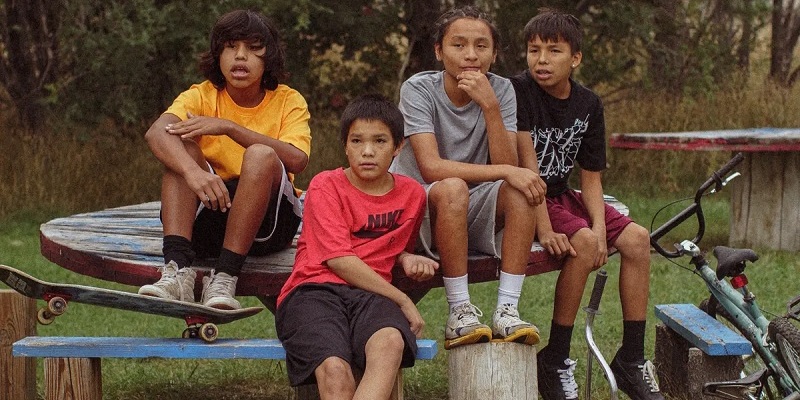
Review by
Eric Hillis
Directed by: Riley Keough, Gina Gammell
Starring: Jojo Bapteise Whiting, Ladainian Crazy Thunder, Jesse Schmockel, Sprague Hollander, Wilma Colhof, Ashley Shelton

Like the first two movies of Chloé Zhao -
Songs My Brothers Taught Me
and
The Rider
- War Pony is set in South Dakota's Pine Ridge Indian
Reservation and follows the travails of young men facing an uncertain
future. It's less insular in its storytelling than Zhao's films however and
has more in common with traditional social realist filmmaking. Actress
Riley Keough makes her directorial debut here along with
Gina Gammell, and it's not a stretch to imagine Keough took some
notes from her collaboration with that modern British master of social
realist cinema, Andrea Arnold, on 2015's
American Honey. In fact, Keough initially devised the idea for
War Pony through her interactions with two young extras on
that film: Franklin Sioux Bob and Bill Reddy, both of
whom wrote the script with Keough and Gammell.

The film follows two young protagonists who are divided by a few years in
age but are so identical in their personalities that you might wonder if
they're actually the same character at two different points in their life.
Matho (LaDainian Crazy Thunder) is roughly 12 years old and has been
raised in an unstable environment by his drug dealing father. Finding his
old man's stash of meth, Matho and his friends decide to strike out on their
own in the world of drug dealing. Their naivete leads to Matho being kicked
out of his home and staying with a Fagan-esque aunt who employs a horde of
pubescent kids to sell drugs on the reservation.
Elsewhere, cocky late teen Bill (an astonishingly good Jojo Bapteise Whiting) is similarly looking for a fast way to make an easy buck, albeit through
legal means. Buying a dog from Echo (Jesse Schmockel), the mother of
one of his two young kids, Bill plans to breed the animal and sell the
puppies for a lucrative sum. Bill hopes this will bring him closer to Echo,
who resists his undeniable charm and keeps him at a distance from herself
and her son. While waiting for the dog to give birth, Bill takes a job as a
general dogsbody for a local wealthy white turkey farmer. His role mostly
consists of ferrying young Lakota women on and off the reservation to
facilitate his employer's extra-marital affairs.

Despite its very American setting and very American theme of
entrepreneurial endeavours, War Pony has a universal quality
that could be translated to any part of the world where a working class
community has been left to rot. In its willingness to portray its
protagonists engaging in ethically dubious behaviour (one is selling meth to
kids while the other is essentially sex trafficking young women) without
ever casting judgement, it resembles a product of European indie cinema more
so than its American cousin. There's no suggestion that Matho and Bill are
going to change their ways and adopt more conventional lifestyles, because
that simply doesn't seem to be a choice. These are two young men left to
choke on dust and fumes as the American dream pulls out of town. They're
doing the best they can, and while it's true that their actions are
perpetuating a cycle of hardship and causing trouble to their own community,
what options do they really have?
Regardless of the immoral behaviour they find themselves embroiled in,
Matho and Bill are as charming and likeable a pair of kids as you could
encounter. When we meet them first their macho braggadocio might cause you
to roll your eyes, but as we spend time in their company we quickly realise
it's a front, a defence mechanism. When Matho calls the classmate he has a
crush on a "bitch" when she rejects his advances, we see on his face that he
immediately regrets the insult and probably doesn't even understand why he
said it. Bill probably won't win any Father of the Year awards but you can
tell in his own way he wants to settle down with Echo and his boys, and when
his boss makes a belittling misogynistic comment in front of his wife, the
contempt on Bill's face is clear.

Our familiarity with narratives of this ilk means we suspect Matho and
Bill's paths are headed for tragedy, and there's always a suspicion around
white liberal filmmakers playing in a minority sandbox. I won't reveal
whether this is actually the case or not, but I will say Keough and Gammell
wrap up their film in a surprising manner. For Matho and Bill, the tragedy
has happened before the movie unspools. It happened centuries ago and their
troubles are simply a repercussion of historical attitudes that continue to
prevail. They may not share their specific cultural identity, but you'll
find young men like Matho and Bill in discarded communities across the
globe, young men simply trying to make something of themselves in a world
that would rather keep them out of sight.

War Pony is on UK/ROI VOD now.

